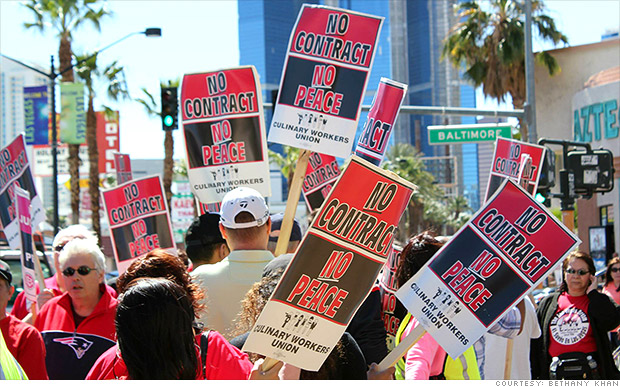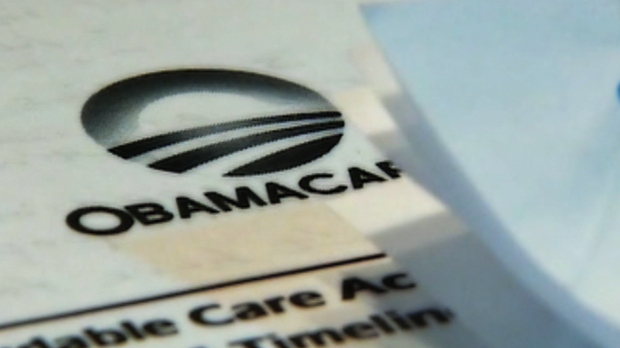
Las Vegas casino workers may strike if their employers don't cover Obamacare fees.
NEW YORK (CNNMoney)
Culinary Workers Union Local 226 is pushing about a dozen of its employers to contribute more money to its health insurance fund to cover rising Obamacare costs.
Currently, employers pay 100% of the premiums. The union, which is in contract negotiations, wants to keep it that way. But the spike Obamacare-related expenses could make it tougher to convince employers to pony up more money.
Union workers picketed outside the Stratosphere over the weekend, ahead of a March 20 vote that would give the union the right to call a strike.
At issue are Obamacare fees and mandates that have greatly increased the health insurance fund's expenses in recent years. What's angering the local, along with many unions nationwide, is that the fund doesn't qualify for federal subsidies to cover low-income workers that for-profit insurers do. The union fund wants these subsidies to help offset the added costs.
Those subsidies, which go directly to insurers, help lower-income Americans purchase insurance on the individual market through state and federal exchanges. But since union plans are considered employer-sponsored plans, there is no federal money to subsidize its members.
So far, White House officials have not made an exception for the unions.
"The administration has made change after change to meet other groups' needs," said Yvanna Cancela, the local's political director, noting the union would like to see the president keep his promise. "Our members want to keep their health plans."
Share your story: Have you begun using your Obamacare benefits?
Many unions, who supported President Obama's push for health reform, feel betrayed because the administration failed to accommodate their health insurance funds in the Affordable Care Act. These plans, called Taft-Hartley funds for the regulations that govern them, cover 20 million Americans and pool contributions from multiple employers to provide health and pension benefits for their members.
The Local 226 fund provides health insurance for about 55,000 kitchen workers, housekeepers, bartenders, bellman, porters, laundry workers and others, as well as 70,000 dependents. Employers contribute $3.96 per worker per hour to cover health and pension benefits. Workers don't pay a premium, but are responsible for about 10% of their out-of-pocket medical costs.
Since Obamacare was passed in 2010, the culinary union's fund has had to shell out $23 million to cover members' children up to age 26, Cancela said. And this year, it is facing a transitional reinsurance fee of $63 per insured person, which adds another $7 million to the cost. The reinsurance fee reimburses insurers on the exchanges who face high claim costs.
But since union members can't strike against the White House, it is pressing its employers to boost their contributions by 35 cents per worker in the first year, 50 cents in the second and 55 cents in the third. So far, the union has reached agreement with five casino operators, leaving 7,000 union members with expired contracts.
If the remaining employers don't agree to the terms, the union may strike.
Ultimately, the local and its umbrella organization, Unite Here, want the Taft-Hartley plans to be considered qualified to participate on the Obamacare exchanges and receive subsidies. Those federal payments will help defray the costs of the Obamacare mandates and fees.
But that is not an easy step, said Tim Jost, a health law professor at Washington and Lee University School of Law. The insurers on the exchange are providing plans to people who aren't getting coverage through their employers.
"The key reason they can't participate in the exchanges and receive federal subsidies is that they are not individual market plans. They are group plans," Jost said, of the union funds. ![]()
First Published: March 11, 2014: 7:15 AM ET
| < Prev | Next > |
|---|







 Copyright © 2024 ToCasino.net Online Casino. All Rights Reserved. Designed by
Copyright © 2024 ToCasino.net Online Casino. All Rights Reserved. Designed by